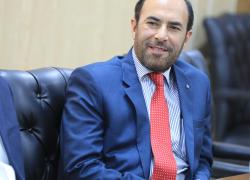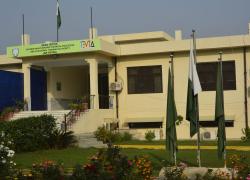Managing Human Resource in Public Sector Universities of Khyber Pakhtunkhwa, Pakistan: Problems and Prospects
With poorly trained staff, persistently dogged behavior and obsolete organizational structure, official business in the public sector universities in Khyber Pakhtunkhwa are governed in an orthodox fashion. Over the years, management of human resources in these organizations has not received the desired level of attention.
Our research study investigated how the HR system was designed and functioning in the public sector universities in Khyber Pakhtunkhwa. This study was aimed at looking into the prevailing HR system with a prime focus on five major themes including HR system, structure and capacity, recruitment and selection, training and development, performance appraisal and promotion and career development in the five selected universities. The study identified a number of loopholes in the HR system in these universities for improvement.
The study will help academia, policymakers and practitioners to restructure their HR system in line with global HR best practices to meet the emerging challenges of the contemporary academic world and fulfill the growing expectations of the stakeholders.
Introduction
In the backdrop of mounting pressure from the general public, government and global academic market, managing human resource have become ‘a critical issue for contemporary universities’. Being, an under-researched area, our qualitative study investigated how HR system was designed and operated in the public sector universities with special attention on the five major themes (i.e. HR system, recruitment and selection, training and development, performance appraisal and promotion).
Background
The increasingly fast track socio-economic development, scientific discoveries and fast track technological advancement in recent decades have transformed the entire landscape of higher education. Around the globe, there has been recorded an unprecedented increase in the number of students pursuing the university-level education in the technologically advanced countries multiplying the number and type of institutions devoted to higher education and research. Collaboration among the critical mass of scientists, practitioners and academicians flourished. Reliance on government funding has immensely diminished and scarce resources are being utilized in a more judicious manner.
Regardless of these revolutionary reforms, universities in Pakistan, by and large, remained traditional, obsolete and outdated. The internal process and operations are virtually manual. Deteriorating financial health, dearth of the culture of genuine research, shortage of dynamic leadership, limited opportunities for career growth are few of the bottlenecks confronted by the public sector universities in Pakistan. In the same vein, much attention has not been paid to the management of human resources in the higher education institutions in Pakistan. With the mushroom growth of the universities, the HR challenges confronted by these academic bodies multiplied. In fact, HR is one of the most neglected areas in the public sector universities in Pakistan5. This study inquired into the prevailing HR practices in the five public sector universities of Khyber Pakhtunkhwa with prime focus on five themes mentioned above.
Findings
The data collection process resulted in very valuable information regarding HRM practices in the selected universities. It was noticed that universities, in general, confront serious problems in connection with managing human resources. These findings are discussed at length in the following sections.
- HR System, Structure and Capacity
To begin with, system approach is not adopted towards staffing function. This malfunctioning at the strategic level precluding execution of coherent and integrated HR processes. Those who mainly deal with HR issues were found not to be HR specialists and even those were not properly trained for the job. Universities in the public sector, in general, did not have a full-fledged, separate office to take care of HR issues. Similarly, there is no statutory body or Council (i.e. HR Council) overseeing HR affairs in the universities.
2. Recruitment and Selection
In fact, the recruitment and selection function in the public sector universities is facing a whole host of troubles. The whole process from advertisement to final selection is plagued by numerous lacunas and hounded by inadvertent delays. In universities, the selection decisions, generally, is open to severe critique. The selection decisions are not based on an impartial assessment of individuals’ ability to perform a job in the best possible manner. The work-related attributes including qualification, skills, abilities, relevant personal qualities, the potential for future growth, the ability to contribute to team performance are not taken into consideration during the entire process of assessment.
- Training and Development
In the selected universities, there is no defined policy for capacity building of employees. Once selected for a job, the employees seldom find ample opportunities for training and development. Pre-serving training, considered as mandatory for new entrants has not gained wider currency in the universities. To begin with, very limited allocation is being made in the universities’ budget for training and development component. Wherever, any allocation is made for the purpose, spending on this account remained the lowest.
- Performance Appraisal
There is no effective performance appraisal system in place for evaluation of the performance of staff in the selected public sector universities except the yearly annual confidential reporting that happens to be nothing more than just a formality. It has never been linked with compensation or pay increase. Obsoleteness of the system, untrained evaluators and non-involvement of the concerned staff in the appraisal process are the potential bottlenecks in the performance appraisal system. Data revealed that majority of the heads of the departments are not aware of the philosophy of modern appraisal system. Targets and goals are neither mutually set nor formally shared with the staff. Performance review discussion is not held between the head of the department and the staff.
- Promotion and career development
The career development practices in the selected universities are characterized mainly by congestions in career channels, rapid and unplanned up-gradation and subsequent promotions of some of the cadres and stagnancy of the rest of the cadres. Data revealed that there is a general apprehension about career development practices as universities largely failed to devise career development programs.
Recommendations
Public sector universities need to restructure HR system in line with global HR best practice. Establish a robust link between training and promotion, formulating formal training plans and establishing priorities for international assistance in capacity building activities are required. The system of performance evaluation should be linked with the promotion and reward system. The time period of evaluation should be reduced from one year to six months.
Conclusion
As the jobs in today’s dynamic academic world have become more complex that requires significant interaction with sophisticated technology, the universities HR office must ensure that they have the right people for the right jobs. This requires the university to have a robust HR system in place, duly supported by effective and efficient HR subsystems. For the realization of these objectives, exceedingly empowered, technically skilled and highly motivated human resources are inevitable. In fact, it is all about the complete transformation of HR function, establishing a warm and welcoming relationship with key stakeholders and reckoning the foremost outcomes of human resources in the academic settings.
Prof. Dr.Usman Ghani, and Dr. Mehboob ur Rashid are the co-authors of this research article published in the Dialogue-Quarterly Research Journal, available on http://www.qurtuba.edu.pk/thedialogue/The%20Dialogue/13_3/04-%20271-%20283,%20sayed%20hafeez.pdf


















